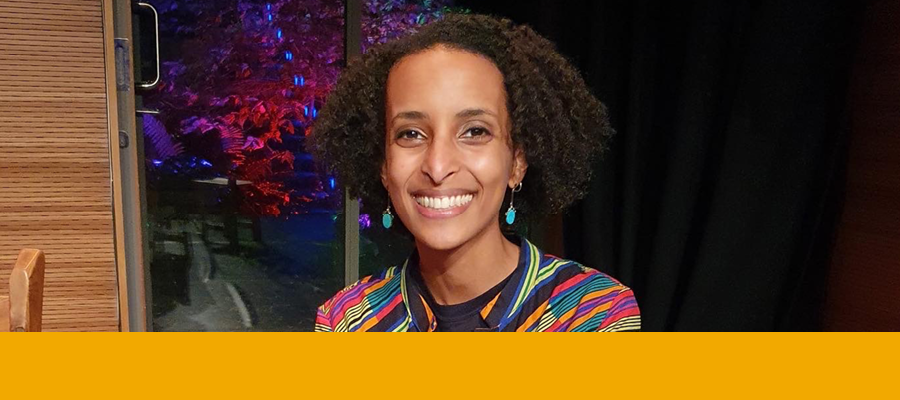Zebib Abraham

Zebib is a practising psychiatrist and an accomplished writer. Driven by her passion and understanding of human psychology, Zebib enjoys exploring her characters’ identities and taking them on journeys where they confront their own fears.
Name: Zebib Abraham
Degree course: MSc Creative Writing 2021
Year of graduation: 2021
At the moment
What is your current role, and how did you get there?
I am a psychiatrist and writer who writes fiction in the space between the literary and the speculative. My work in psychiatry informs how I write character and explore identities and fears through horror, the uncanny, and the surreal. I took time off from my psychiatric work to complete my MSc in creative writing at the University of Edinburgh. I graduated in 2021.
I was already qualified as a psychiatrist before my MSc in creative writing, and have since returned to my psychiatric work. After my MSc, I have been able to work in the writing field as well. I’ve been a Royal Literary Fund Fellow, running the Edinburgh Reading Round group for 2024-2025. I’ve also been able to run workshops, host literary festival panels, and write commissioned work.
What inspired your interest in this field?
I’ve been in love with writing since age eight, when I wrote my first short story. I have always loved reading, and was amazed by the ability to create whole worlds and direct my characters in their adventures. As an adult, I enjoy exploring my characters’ interiority and taking them on journeys in which they confront their own fears and defenses.
Career journey
What were some key milestones in your career journey?
Completing my MSc in creative writing with honors was a milestone, as it was a major real and symbolic step in my commitment to writing; I took a year off of my job and devoted all my time to writing. Getting my short fiction published and getting paid for my writing was another big step. Since then, getting representation from my wonderful literary agent was a huge step to my writing career. I was awarded the New Writers Award, specifically the Callan Gordon Award, for 2025-2026. I also have a debut book coming out in 2027 with Amistad (Harper Collins), called “My Darling Clementine”.
How did your time at the University shape your professional path?
My time at the University of Edinburgh exposed me to the process of critique from colleagues and mentors. It was really valuable to meet with my critique group every week and study how others wrote. My mentors were invaluable, providing specific insights and helping me believe in my potential.
Can you share a standout achievement or moment you’re proud of?
My very first published short piece was a big deal for me, and I am still very proud of accomplishing that. I took the initiative to submit my work and was very validated by that first acceptance.
Industry insights
What are the biggest challenges and opportunities in your field right now?
Publishing is increasingly competitive and under financial strain. More people are writing books and there are less opportunities for publishing. Also, in the short story market, many magazines are closing and magazines still publishing are struggling to stay afloat. Despite these challenges, writers are still creating and persevering. AI is a big threat to our creative work, in terms of stealing writers’ work and diminishing the value of human-created content.
What trends or innovations are shaping the future of your industry?
AI is definitely going to impact our industry. In terms of trends, I think that there is continued expansion in speculative genres and interest in cross-genre work. The desire for propulsive narratives continues to grow; editors want books “they can’t put down”.
Alumni wisdom
What do you wish you had known at the start of your career?
I wish I had known how to take breaks and allow rest. In my eagerness to progress in my career, I pushed myself to focus solely on writing in any free time I had, to the determinate of a healthy work-life balance. I wish I knew that less is more; you don’t need endless hours to write, and you don’t have to be self-critical, and rest helps nurture creativity.
What advice would you give to students or alumni looking to enter your field?
I would encourage students and alumni of the Creative Writing masters to, simply, write and keep writing. There is no ideal time to write, so I encourage everyone to accept the imperfect and embrace the joy of writing, wherever and whenever you can. I would also submit your work for publication widely and often, and apply for opportunities for feedback and learning, including mentoring schemes, writing award programmes which offer mentoring, and writing residencies.
Are there any books, podcasts, or resources that have influenced you?
I have been influenced by the work of fiction writers such as Rumaan Alam, Julia Armfield, Martin MacInnes, and short story writers such as Nafissa Thompson-Spires. In the last year, I have read a lot more short fiction, including The Paris Review, The Best American Short Stories, Granta, Guernica, and more. I enjoy literary podcasts that focus on craft and publishing, such as Page One: The Writer’s Podcast, Publishing Rodeo, and Flublishing.
More
🔗 School of Literatures, Languages and Cultures
All opinions expressed in this article are those of the individual and do not necessarily reflect those of the University of Edinburgh.
The University of Edinburgh is not responsible for the content and functionality of any linked external websites and nor does a link imply any endorsement.


